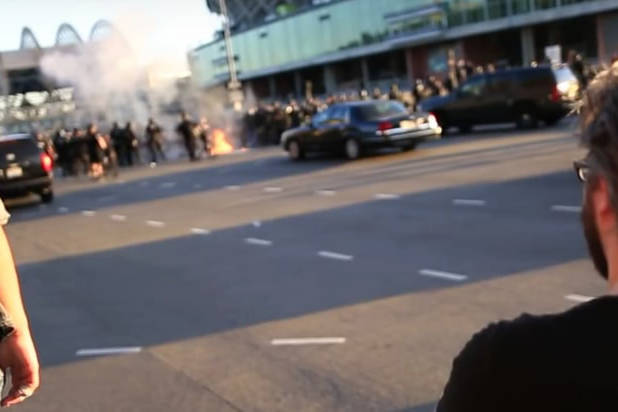This morning, federal police arrested a man who allegedly threw an unlit Molotov cocktail onto the ground in front of police on May Day last year in Seattle. The man, Wil Casey Floyd, was in his mother’s home in Wisconsin, according to the Seattle Police Department and other agencies.
As we reported, the evening May Day anti-capitalist march in Seattle got hairy last year. From 6:30 to 9:00 p.m. or so, marchers and police sparred during a long, slow walk/bike ride from Westlake to SoDo. At times, the fighting became intense: marchers threw full plastic water bottles, glass bottles, rocks, and at least one Molotov cocktail.For their part, Seattle bicycle officers pedaled Downtown and SoDo’s streets, liberally applying pepper spray, coordinated bicycle-shoving, and blast balls. Shrapnel from one blast ball ripped out a section of one observer’s cheek:
Photojournalism is hard #MayDaySea pic.twitter.com/FVhB2uborq
— Sam Levine (@samlevine) May 2, 2016
According to SPD, one police officer was injured by the Molotov that Floyd allegedly threw last year. The officer is now fine, according to Chief O’Toole. SPD says they recovered five shattered Molotovs in total after the march. But the Molotov that ultimately burned an officer was unlit when it was thrown onto the street ahead of an advancing line of bike police. It was a police blast ball that ignited the Molotov’s fuel, as the federal charging document against Floyd acknowledges in a passage authored by FBI Special Agent Michael Louis Baldino, who says he was present at the march:
“At approximately 7:40 p.m., a bottle (later identified as a ‘Molotov cocktail’ device) landed near a line of SPD officers. The Molotov cocktail had not been ignited when it was thrown at the officers, but when it landed it caused one of the officers to accidentally drop a flash-bang device, igniting the liquid in the Molotov cocktail and causing a burst of flames” that burned an officer. Baldino’s statement appears to have one important inaccuracy. He states that the Molotov hitting the ground near police “caus[ed]” an officer to accidentally drop the blastball which ignited the Molotov’s fuel. But video evidence appears to show that half a minute elapsed between the time when the Molotov landed in front of police and the time when it ignited.
We asked U.S. Attorney’s Office spokesperson Emily Langlie about this. She didn’t deny the inaccuracy, saying, “From a legal perspective, it really doesn’t matter…Whether it caused him to drop the flash bang or didn’t, the fact that a vessel of gasoline was thrown…is probably the more important aspect of the case. How can you predict whether a match, a cigarette is then going to be dropped there to light the gas on fire?”
The difficulty of proving that causal connection could explain why authorities are charging Floyd with “unlawful possession of a destructive device” rather than assault. Asked about this, Assistant U.S. Attorney Todd Greenberg, who is prosecuting the case with help from the King County Prosecutor’s Office, said only that it was “the available federal crime here.”
Chief O’Toole said it was “entirely coincidental” that Floyd’s arrest occurred today, three days before May Day 2017. “But I think it is an opportunity to send a message to those who would bring something of this nature to an event…They’ll be arrested, too.”
According to authorities, Floyd was identified through a months-long review of video and other evidence in an inter-jurisdictional investigation conducted under the aegis of the FBI’s Joint Terrorism Task Force (JTTF). From SPD Blotter:
“FLOYD was identified in a lengthy investigation as the member of the so-called ‘Black Bloc’ of protestors who threw unlit incendiary devices at police. FLOYD is charged by criminal complaint with unlawful possession of a destructive device — a felony punishable by up to ten years in prison.” Assistant U.S. Attorney Todd Greenberg said there is no minimum sentence. Floyd could also owe up to a quarter million bucks in fines, according to SPD.
Asked whether the involvement of the JTTF implied that the Molotovs constitute an act of terrorism, FBI Special Agent Jay Tabb replied, “I don’t know that I’d go so far as to call this a terrorism incident. For us, [the JTTF is] the logical investigative entity for the activities regarding this group of individuals, because of the partnerships already built with local, state and federal partners and agencies is the Joint Task Force.”
cjaywork@seattleweekly.com








